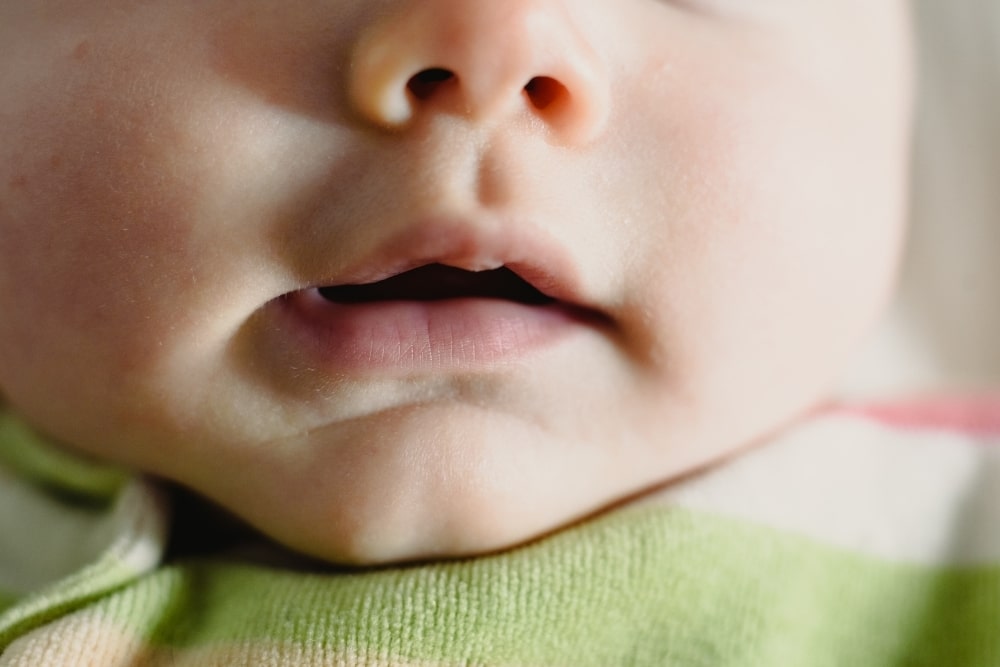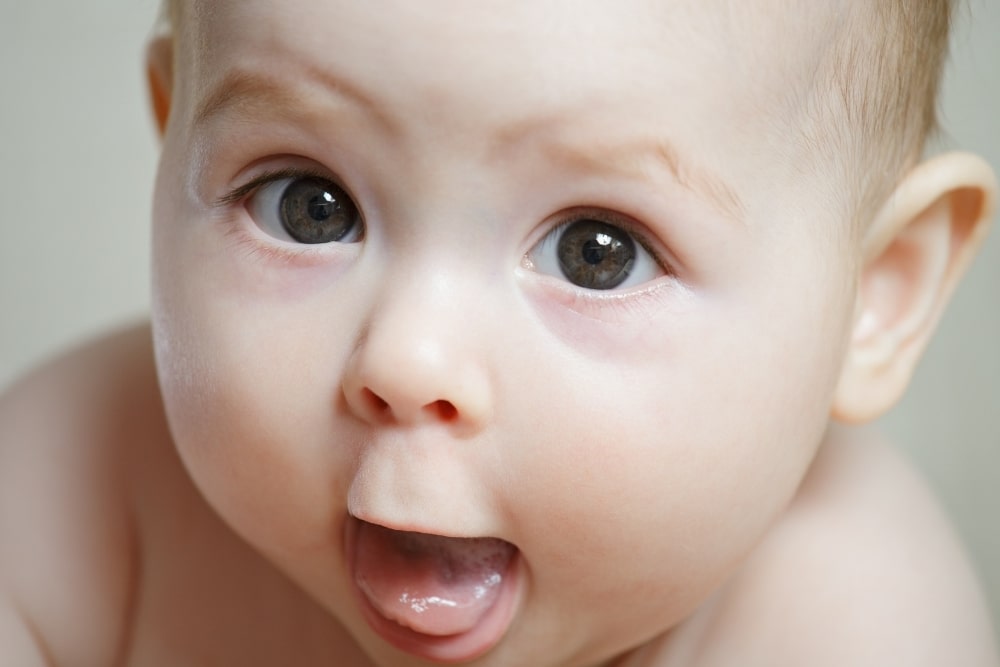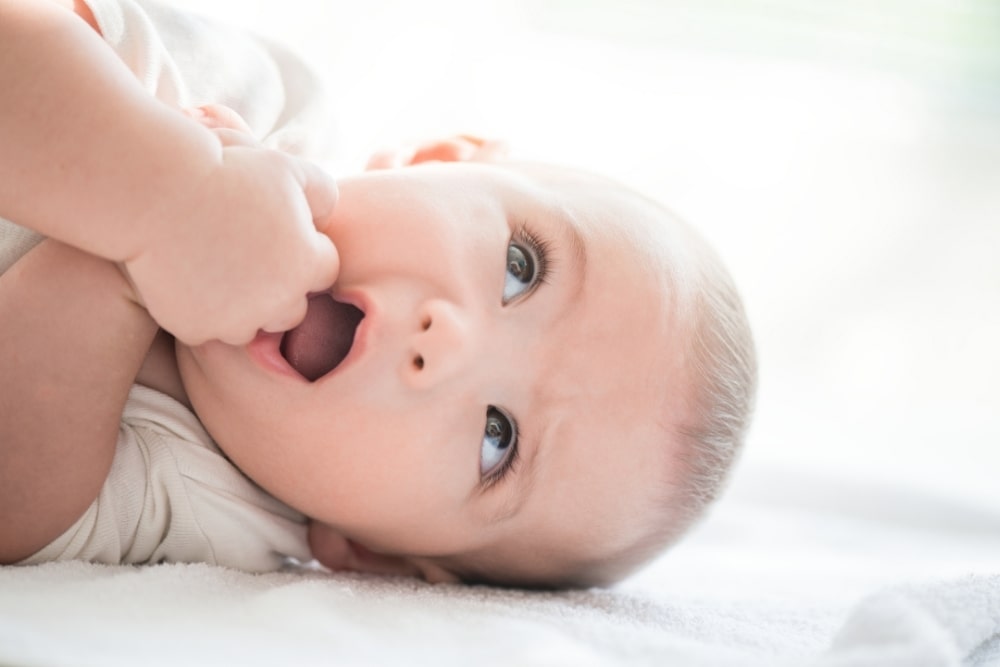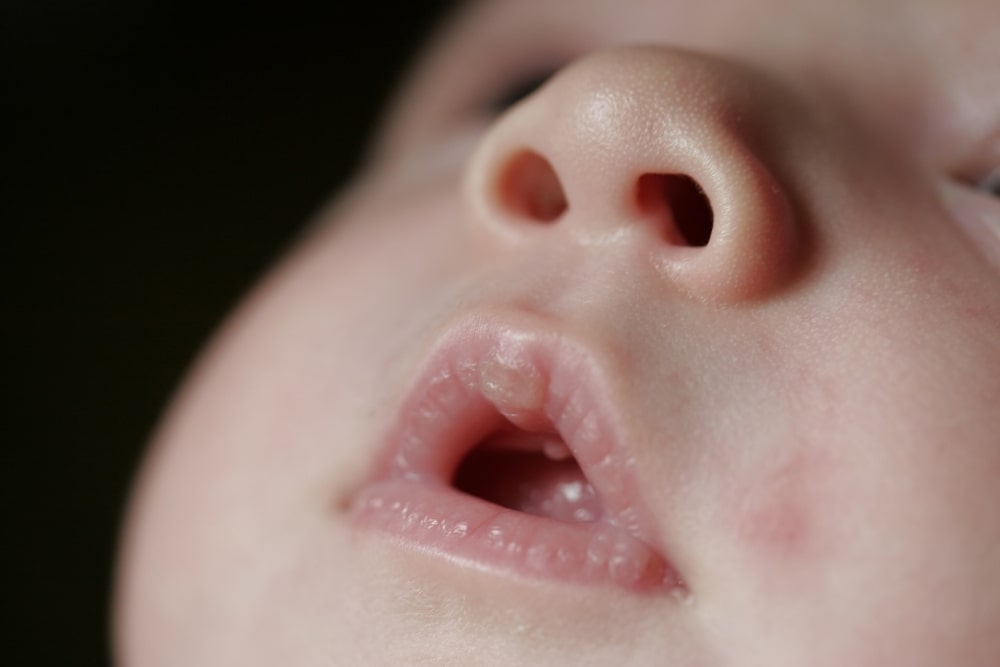You are sitting cradling your precious new baby. Soaking up all their little features, their tiny hands, and fingers, their cute button nose. It all seems surreal that only a few weeks ago they were the ones kicking and punching your bladder.
Everyone I meet seems to have a weakness for that new baby smell. A mixture of bubble baths and lotions and sour milk. Wait? Sour milk?
That’s right! As precious and perfect as your little ones are, they can carry those pesky horrid stinks quite well. From diaper explosions to spit-ups from their feeds not all smells are good coming from newborns.
In this article, we will be looking at the reasons why a baby’s breath smells like vomit, vinegar, or sour milk.
Why Is My Baby’s Breath Stinky?
Many things can contribute to a baby’s bad breath in exactly the same way as they do for adults with the same problem.
Things like the diet they are eating, what oral hygiene routine they are following if any, along with how often they have a pacifier can all contribute to bad breath.
Normally with a few changes to these things, stinky baby breath can be easily dealt with and eliminated.
However, if you have tried changing some or all of these things and the issues persist, it is possible that there is something more serious going on and you need to get some medical help.
So let’s take a look at some of the most common baby bad breath smells, the causes, and what you can do about them.
If you find your baby has:
Sour Breath
You don’t have to be a rocket scientist to work out what the first cause could be that would lead to sour breath.
For around the first 6 months of their lives, babies are on a diet of either breast milk or formula milk so it is common for their breath to smell like sour milk.
Usually, this is nothing to be concerned about and it is very common however in some cases your baby could be developing Gastro – Reflux.
Gastrointestinal Reflux
This is less common in babies. It is when the stomach lining forces the stomach contents to sit in the esophagus. Hence why you can smell the sour milk more prominently.
Whilst doing this it is forcing acid up to your baby’s throat which can become painful and unsettling when they are feeding.
If you are concerned about reflux in your little one lookout for signs of restlessness, refusing feeds, signs of pain and discomfort, excessive vomiting, and or arching their backs whilst crying.
There are many things a doctor can prescribe to help with this so please if that sour smell is lingering on your baby’s breath don’t hesitate to get it checked out!
View in gallery
Sweet Breath
Most parents would not consider sweet-smelling breath a problem but it can in fact be an indication that something is not quite right.
Type 1 Diabetes is an autoimmune disease in which the pancreas produces little or none of the hormone insulin, which is used to break down food properly. Diagnosing diabetes in young babies can be extremely difficult. But there are a few warning signs that you could watch out for:
- Sweet-smelling breath
- Fatigue
- Yeast infections in the mouth or diaper area
- Behavioral changes
- Sugar in their urine.
If your baby is displaying any of these symptoms it is best to check in with your pediatrician. Even though the chance of your baby having diabetes is very small it is better to be safe than sorry.
Vinegar Breath
You may be reading this thinking ‘is this for real?’ But if you are a parent that is facing a child with a vinegar smelling breath then you will soon learn that this can be a very real smelly issue!
Firstly, the smell of vinegar may not be your baby’s breath. As we fall in love with our baby’s we can pinpoint every wrinkle, crease, and skin roll on their bodies. Guess what… so can milk!
You may find that a quick outfit change, bath, or spot clean around your baby’s neck, face, throat, and chest may be enough to get rid of any spit-ups that you have missed.
Milk once left to dry can have a vinegar smell so it could be a quick wash to remedy this issue!
If a wash and change of clothes have not got rid of the vinegar smell and the smell is definitely coming from their mouths then it’s time to investigate it further. If the problem is persistent then a quick trip to the doctor will be needed to rule out any nasty bugs.
Gastroesophageal reflux disease
This is otherwise known as GERD and it can have an effect on your baby’s breath. Acid reflux can also be the reason for sour or vinegar breath if it is accompanied by other symptoms such as:
- Colicky behavior
- Gas
- Vomiting
Vomit Breath
This can be quite a common smell on your little one’s breath. Most babies may vomit during and after meals and this is purely down to their immature digestive system.
View in gallery
Like you and I, they have to learn about when to say no to more food. This can become difficult if you are handing them a heavy stream of luscious milk.
If their stomach becomes too full then they will expel any excess that they don’t need. Taking this into account it is no wonder that the smell of vomit may linger on their breath.
Although this is common if you notice that the vomit smell is constant you should really be looking for some other symptoms signaling that your little one may have some digestive or dietary problems that need addressing.
It could be a sign of acid reflux or GERD and they should be seen by a pediatrician.
Cheese Breath
If your baby has a cheesy breath then the first thing that you need to do is eliminate the possibility that it is actually them that has the cheesy odor.
Start by giving them a good wash making sure that you get into all the little folds of skin all over their body and a fresh change of clothes.
If after a change and bath you realize that it is in fact not your baby that is the offender and the odor is definitely coming from their mouth it could just be the formula or breast milk that they are consuming.
However, consistent cheesy breath can also be a sign of oral thrush. This is a common problem in both adults and children and is caused by yeast overgrowth, it can easily be treated with the correct medication.
Metal Breath
If your baby’s breath has a metallic smell, you may want to double-check that your baby is not sick or dehydrated. You should also check that your baby does not have any cuts or ulcers in their mouth as blood does have a metallic odor.
If even after following good oral hygiene and the smell is still present then you need to consult a pediatrician.
Although this is usually a symptom of common illness or dehydration it could also be a sign that your baby is suffering from acid reflux, GERD, or respiratory infection.
Garlic Breath
Although your baby is unlikely to be chowing down on the latest Italian delicacy there is the possibility that the flavors that you are eating are making their way into your breastmilk.
If your baby is already started eating solids then there is the chance that it could simply be something that they have eaten. Grab a toothbrush and give that mouth a quick clean not forgetting their gums and tongue as well as their teeth.
View in gallery
Poop Breath
When it comes to a breath that smells like poop, there are several causes that you will need to consider. First of all, you need to follow good oral hygiene practices in order to prevent the build-up of any odor-causing bacteria.
If your baby does not have teeth then a wipe of their gums with a clean wet cloth should do the job.
But if your baby is older and has teeth then they should already be brushing and flossing twice a day. If you have already been doing this then there may be other causes.
Pacifiers and thumb sucking can lead to bad breath this will be due to bacteria being introduced to the mouth. Make sure that anything that enters your little one’s mouth from hands, pacifiers, and teething toys are meticulously cleaned regularly.
If neither of these reasons solves the problem then a visit to your pediatrician would be advised to rule out any common illnesses such as respiratory infection, sore throat, or even a common cold.
There are more serious conditions that the foul breath could be an indicator of such as a dental abscess, oral infection, a side effect of prolonged vomiting, or bowel obstruction.
Fish Breath
If your baby’s breath has a fishy, ammonia, or even urine odor to it and it is not resolved by brushing or washing your baby’s mouth and face, then a trip to your pediatrician is your next move as it could be a symptom of a serious liver or kidney disease.
Understanding Oral Hygiene in the Early Years
Most parents overlook oral hygiene before a baby has their first tooth, but according to experts, it can be a vital step to improving the bad smells that may linger in your baby’s mouth.
We are not expecting you to buy your newborn a toothbrush and paste just yet. However, gently rubbing your baby’s gums with a wet cloth can help get rid of any bacteria that may be causing unpleasant smells.
As soon as you notice a little pearly tooth appears, it is recommended that you brush softly with a tiny amount of baby toothpaste.
This not only helps your dear little one understand that this is now part of their routine but it also provides great early care for their milk teeth.
As the number of teeth they have increased, you will notice that brushing is now a normal part of your daily routine and that your child will be more likely to allow you to keep an eye on their teeth.
It is also important to get a check-up with a pediatric dentist by the time your little one turns one.
Other Reasons For Stinky Breath
View in gallery
After looking through the many reasons why your baby has a foul lingering smell on their breath and deciding that you are now doing everything in your power to help them, it may be time to look at other factors. Some of these are:
Sickness
If your little one is feeling under the weather this may have an impact on their breath. Let’s face it we have all been there with the horrid taste in our mouths when we are unwell.
The same applies to babies and children. If your baby has a cold or mucus in their nose then this can contribute to mouth breathing and their breath can be a tell-tale sign of infection in the throat or sinuses.
If ever in doubt check with your doctor and I’m sure they will be able to prescribe medication if it is needed.
Teething
Generally teething is not a known culprit for bad breath in babies. However, I found that when a new tooth was due their breath definitely changed odor.
Just remember that every baby is different and if you have ensured that their mouth is clear of foreign bodies then you should consult with a dentist just to rule out any mouth infection.
FAQs
Why does my baby’s breath smell like rotten eggs?
If you find your baby’s breath smells like rotten eggs then it is likely down to the way they are digesting food.
When food is broken down in the mouth and digestive system, it creates a chemical compound known as Hydrogen Sulfide. This is a normal process, however, in some cases, more of this compound is created resulting in bad breath.
What causes bad breath in babies with allergies?
Allergies and sicknesses can cause poor drainage in the sinuses. This is definitely a contributor to smelly breath in adults and children alike.
How often do I change my baby’s toothbrush?
You should be aiming to change your toddler’s toothbrush at least once every 3 months or when the bristles start to spread out.
[amalinkspro type=”showcase” asin=”B013W6CCRM” apilink=”https://www.amazon.com/dp/B013W6CCRM?tag=mominformedcom-20&linkCode=osi&th=1&psc=1″ new-window=”true” addtocart=”false” nofollow=”true” sc-id=”5″ img-sizes=”500:500″ imgs=”https://m.media-amazon.com/images/I/41YVmU8YklL._SL500_.jpg” link-imgs=”false” btn-color=”#ff9900″ btn-text=”Check Price” alignment=”aligncenter” hide-prime=”0″ hide-image=”0″ hide-price=”0″ hide-button=”0″ width=”550″]Dr. Brown’s Infant-to-Toddler Toothbrush Set[/amalinkspro]
Sometimes bad breath occurs with infection and if this is the case, change the brush straight away to lessen the impact of harboring the bacteria on their brush.
The Final Thought
Ultimately a baby is the sweetest part of life and everything about them is a magical wonder.
From the very first moment of learning about your pregnancy to the day they are placed in your arms, the relationship and bond between mom and baby are spectacular.
Don’t allow the nasty breath to overshadow your judgment. You know your baby best! If you feel like something is not quite right then best to check it out with the doctor/dentist.
We all have bad breath from time to time and babies are no exception. Follow the good oral hygiene tips and tricks mentioned in this article and I am sure your precious one will be smelling sweet again in no time!
Babies are curious things and they do plenty of strange things that nobody tells you about, to find out more check out the 15 things nobody tells you about babies.






